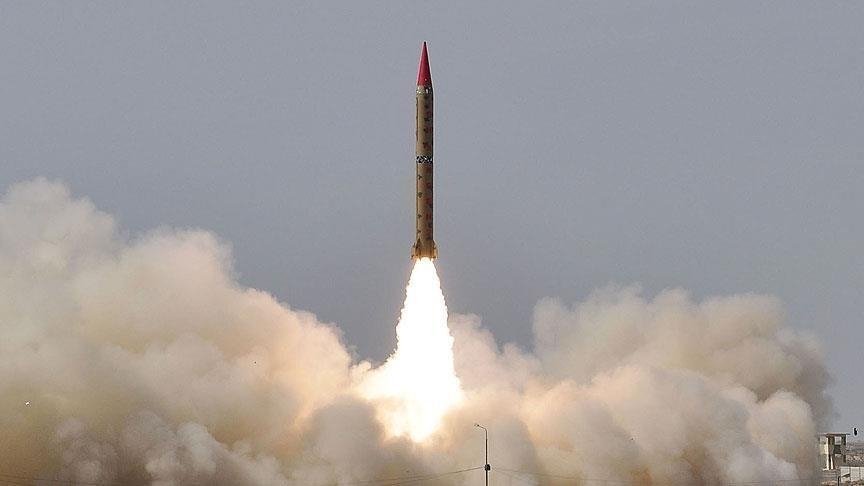Regional stability is at stake with extremists outfits in India in power corridors. These outfits are putting entire regional economic, political and strategic cooperation in jeopardy. Hindu fanatics have fully taken over the charge of Indian decision-making bodies. This development has raised some stern questions about the possibility of new conflict in the region. As India is also a nuclear state, its nukes are also in the possession of a warmongering establishment and may slip into the hands of Hindu zealots. If this happens, it will have perilous consequences not for the region but for the entire international community. The leaders in the Indian establishment must ensure the safety of its nuclear arsenals and that it should not go into the hands of Hindu monks.
Nuclear weapons are not a joke. The safety of nukes should be the top priority of every state, that possessed them. Misuse of nukes will create an unending/ destructive conflict in the world. Countries who are having nuclear stockpiles must learn from Pakistan how to ensure the safety of nuclear weapons. Pakistan, despite having limited resources and facing a hostile campaign against its nuclear arsenals, has established robust and state-of-the-art mechanisms for its conventional weapons. International bodies for nuclear weapons have lauded Pakistan many times for its robust mechanism to protect nukes.
Likewise, our neighbor India is behaving irresponsibly when it comes to the safety of nuclear assets. The fear of grabbing Indian Weapons of Mass Destruction (WMD) in the international black market has increased and now become a reality. In the past few months, some terrible news came out from India where some common people had stolen enriched uranium to sell out in the black market. The news grabbed the attention of strategic experts worldwide.
The incident was first reported on 07 May 2021 in the state of Maharashtra led by an extremist wing of RSS called Shiv Sena. The same day, the state police of Jharkhand detained 10 people for illegally possessing and planning to sell enriched uranium in the black market. State’s law enforcement agencies contended that they seized 6.4 kg of ‘uranium mineral’ from two of the accused, however, they are yet to nab the leading suspect from whom the mineral was procured. Again in June, Indian police arrested 07 people for illegally possessing highly radioactive substances. According to the anti-terrorism squad in Maharashtra, confiscated material is worth around $2.9 million. Similarly, in March 2021, 4 Nepal’s citizens were arrested for retaining 2.5 Kg of unprocessed uranium. One of the arrested claimed that her father-in-law brought it from India where he worked in a uranium mine some 20 years ago. Recently, on 15 February 2022, Nepali police arrested 8 people including two Indians on charges of illegally trading in Uranium.
It is the fourth time in India that such a highly radioactive substance has been seized by police in recent years. In 2016, police also seized almost 9kg of depleted uranium in Maharashtra. Uranium is used in several areas, including nuclear explosives and medical techniques.
The uranium, which is confiscated is uranium 238, which is the most common isotope of uranium found in nature. The same can be processed into the finer form of uranium 235 after going through multiple sophisticated procedures. However, the possibility of transforming uranium 238 into refined uranium-235 is likely only in India. Uranium 235 is mostly used to build nuclear arsenals.
The UNSC’s Resolution 1540 and the world body of nuclear weapons IAEA Convention on Physical Protection of Nuclear Material (CPPNM) make it binding on states to ensure stringent measures to prevent nuclear material from falling into wrong hands. Unfortunately, India has failed to abide by the rules for the protection of nukes.
These incidents were an eye-opener for the international community and strategic organizations that were rather worried about Pakistan’s nuclear stockpiles. Indian state’s negligence raised concerns regarding the sale of nuclear material in the black market. This act, under state patronage, was criminal and punishable. The irresponsible approach of India towards its WMD is leading to chaos that its nukes may fall into the hands of smugglers and warmonger traders. In addition to this, Pakistani authorities have been consistently sensitizing the international community/ organizations over the likely theft and illicit sale of radioactive material in India and by its nationals abroad.
The recent incident in India has proved Pakistan’s concerns true and valid. Now, it is up to the international community and nuclear watchdogs to take notice of the recent incident and punish India for its failure to establish a robust mechanism for the protection of WMD. This Indian approach also makes him non-illegible for having membership in leading elite clubs of WMD. The increasing cases of nuclear-related incidents have indeed jeopardized India’s aspirations to become a de-jure member of the Nuclear Suppliers Group (NSG), a body that controls nuclear trade.
Likewise, with such incidents, New Delhi’s place has been put in an awkward position with global pressure increasing over India’s poor safety standards. A leading US non-proliferation watchdog, Nuclear Threat Initiative (NTI) nuclear security index gave India the lowest ranking for its poor safety and security of nuclear material in its latest report.
